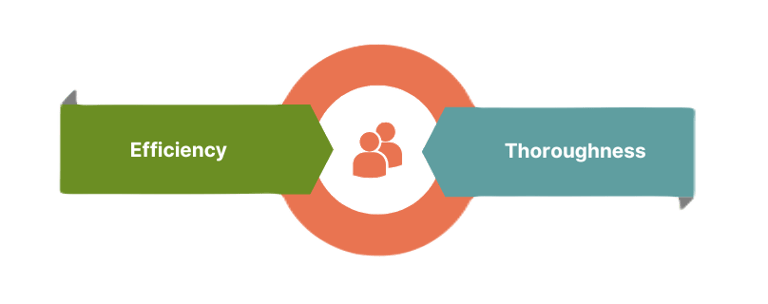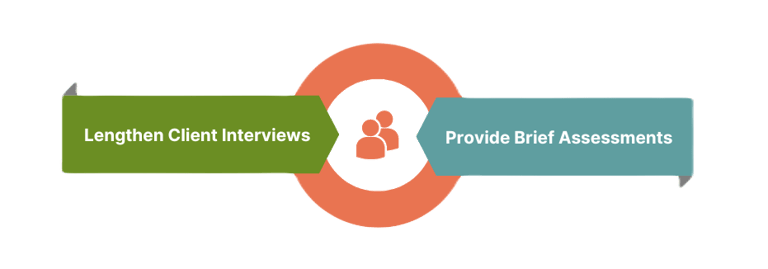
Assessments Without Worry.
Thorough Without The Time.
The Way You Were Taught


There are frustrations and challenges with the assessment traditional model that reduce the effectiveness of a psychologist and other mental health experts.
Report Writing: The sheer time commitment involved in report writing remains a major source of frustration amongst psychologists. Composing detailed, comprehensive reports demands significant time allocation, diverting resources away from direct client care. This can create bottlenecks within practices, impacting appointment availability and wait times.
Rule In / Rule Out: The weight of correctly diagnosing and addressing a client's complex mental health needs can be immense. Psychologists may worry about omissions during history taking or the appropriateness of their test selection. This fear of "missing something" crucial can be a source of anxiety during the assessment process leading to the addition of unnecessary tests or additional interviews.
Manual Scoring: Manually entering the data to score psychological test batteries can be exceedingly tedious and time consuming. Or worse, paper-based questionnaires are used and scoring has to be done by referencing normative data sets. Potential data entry or calculation errors and needing to obtain the most relevant researched norms for a particular client can increase the risk of burnout for psychologists and diminish the time available for clinical interpretation of the results.
Fortunately, we are proposing ways to mitigate some of these frustrations with process improvements and technological advancements.
This flowchart outlines the core structure of a traditional mental health assessment. This represents the high level steps psychologists have traditionally performed. A comprehensive assessment could take upwards of 10 total hours and often involves the psychologist throughout the entire process.
There's research on not needing cognitive testing for ADHD - Research below.
Proposing a Better Way


Key Advantages of the Hyperfocus Way:
Step 1 - Request Forms: The very first step is for you (the assessor) to send history forms and questionnaires to the client. The client will complete these forms at home, in their car, or where it's most convenient for them. You no longer need to spend time with the client at this step.
Step 2 - Booking an interview: Once the clients have completed the forms and questionnaires you requested, this is an optimal time to book the interview. This incentivizes clients to finalize their history forms and questionnaires soon, as they know you will schedule their interview as soon as that is completed.
Step 3 - Review & Analyze: The automated scoring eliminates manual data entry, calculations and scoring errors. Review interpreted results that are based on established norms. This can bolster your confidence in the data analysis stage and improve your understanding of the client's self report.
Step 4 - Interview: This is where you shine. Backed with an in-depth history and psychologically interpreted questionnaire results, you are prepared for your interview. During the interview, use the Hyperfocus Session Note to write down your observations, interview notes, and any relevant updates to the client's history and presentation since they completed their forms.
Step 5 - Report Writing: You can begin with a report template and pull information captured within Hyperfocus into the relevant sections of the report. The data is easy to find because it's all in one place. Insert a summary of their history, interpreted results, interview notes, and then create your opinion and recommendations sections.
Our goal is to improve the assessment process by making it more efficient (speedier) and more thorough (deeper). By adjusting both of these, we also make the process better for clients. One of the best benefits is receiving feedback from clients that they felt understood and heard. They also appreciate the comprehensiveness, which gives them more confidence in their assessor.
Often psychologists are thorough with their assessments and it's physicians who have less time to commit to gathering and reviewing a patient's full history. On the flip side, it often takes a psychologist more time to write a report, while a physician provides a working diagnosis much more quickly.
What if we could have the best of both worlds?
The Hyperfocus Way: A Streamlined Approach to Mental Health Assessment
The Hyperfocus Way is designed to address the common challenges psychologists face within the traditional mental health assessment process, aiming to enhance efficiency without sacrificing depth. By incorporating the Hyperfocus app into your workflow, you can reclaim valuable time currently dedicated to administrative tasks and utilize it for more impactful client interactions.


... is up to you.
Hyperfocus empowers you to decide how to best utilize the time saved through its efficiencies. You can opt to:
What You Do With Your Spare Time...
Lengthen Client Interviews: Devote more time to in-depth interviews, fostering stronger rapport and gathering richer clinical data directly from your clients.
Provide Briefer Assessments: Offer brief, focused assessments for clients who may not require comprehensive evaluations. This can help address waitlist concerns, reduce costs to clients, and expand access to mental health services.
Overall, the Hyperfocus Way offers a streamlined approach to mental health assessment, aiming to improve efficiency and thoroughness without compromising the quality of care you provide to your clients.


Research
Fuermaier, 2015
"Despite decades of research, the neuropsychological profile in ADHD is mixed and the outcomes of different studies vary. Patients with ADHD clearly differ from controls at group level in terms of cognitive functioning, but there is no special cognitive test profile for the individual diagnosis of ADHD. At group level, executive functioning shows abnormalities in visuo-spatial, verbal working memory, inhibition control, vigilance, and planning. Patients with ADHD make suboptimal decisions by overestimating the extent of the immediate reward, rather than considering the delayed rewards. ADHD patients also show differences in timing, speech and language, memory, speed, and response time. Patients with ADHD may have abnormalities in several cognitive areas, or in none at all. The conclusion is that cognitive functioning does not sufficiently reflect behavioral symptoms. Neuropsychological research, therefore, has no added value in the diagnosis of ADHD (Fuermaier et al., 2015). However, it may be useful to map cognitive functioning for other purposes. Neuropsychological research in adults with ADHD is carried out for differential diagnosis of comorbidity, when investigating IQ, or to gain more insight into the personality or coping style of the patient."
Fuermaier, A. B. M., Tucha, L., Koerts, J., Aschenbrenner, S., Kaunzinger, I., Hauser, J., et al. (2015). Cognitive impairment in adult ADHD – Perspective matters! Neuropsychology, 29(1), 45–58
See the Difference for Yourself
Are you a psychologist seeking to optimize your assessment process? Discover how Hyperfocus, like Dr. Sira, can elevate your practice.
Sign up to learn what we're doing for physicians & psychologists.

Assess Mental Health With Clinical Intelligence
Products developed by Hyperfocus Software
